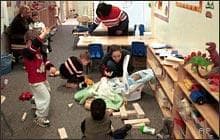Advertisement
The Effects of Child Care
Resume
For a generation and more now, millions of the youngest Americans have spent their days in child care, day care, or pre-school while mom and dad went off to work. And what has it got them? Higher math and reading skills, say two big new studies, especially for the poor, but also childhood behavior problems, especially for the more affluent.
A California study found that day care kids from families with incomes of $66,000-plus were less cooperative, poorer at sharing and motivated engagement, and were more aggressive. That's news that chills a parent's heart. But it passes, we're told, it passes.
Hear about the American child-care nation, and the children it creates.
Guests:
Tamar Lewin, domestic correspondent for news and education at the New York Times
Cathryn Booth-LaForce, professor of child and family nursing and adjunct professor of psychology at the University of Washington, where she is also a research affiliate at the Center on Infant Mental Health and Development. She is co-author of the new study, "Early Child Care and Children's Development in the Primary Grades."
Bruce Fuller, professor in the Graduate School of Education at the University of California at Berkeley. He is co-author of the new study "How Much is Too Much? The Influence of Preschool Centers on Children's Development Nationwide."
Kate Johnson, first grade teacher, Visitation Catholic School on the South Side of Chicago
This program aired on November 8, 2005.